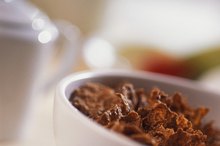What Fruits Are Good for Women Trying to Get Pregnant?
Trying to get pregnant can be an exciting albeit stressful time in a woman's life. What you eat, drink, weigh, smoke and how active you are all influence your chances of conceiving. An app like MyPlate is a great tool to help keep track of your nutrition and exercise plan.
Eating a healthy diet — one that's rich in iron, zinc, folate and antioxidants — improves your chances. Fruit is an excellent source of these nutrients, while also providing other benefits such as minerals, hydration and fuel. Some fruits may be better than others when you're trying to get pregnant.
Read more: Foods to Eat While Trying to Get Pregnant
Tips
Fruits that make good choices when you're trying to conceive include oranges, dried apricots and strawberries and other fruits that are rich in vitamin C, zinc and folate.
Pump Up Your Iron
Vitamin C helps the body to absorb iron, making it more effective. Iron-containing fruit includes sun-dried tomatoes, apricots, raisins, coconut, squash, watermelon, grapefruit and prunes.include:
- Iron-containing fruit includes sun-dried tomatoes
- apricots
- raisins
- coconut
- squash
- watermelon
- grapefruit
- prunes
Zinc: A Little Goes a Long Way
Fruits High in Selenium
Learn More
Research conducted at Northwestern University indicates that just prior to peak egg fertilization, the egg or gamete requires as much as 50 percent more zinc before it can move forward in its developmental journey. This means that maintaining an adequate supply of zinc is beneficial if not critical.
Read more: What Are the Benefits of Zinc for Women?
Essential Folate for Neural Development
The Centers for Disease Control and Prevention recommends taking 400 micrograms of folic acid starting one month prior to trying to conceive 4. Supplements are an insurance policy, but nothing beats getting nutrients fresh from food sources.
Read more: Foods Rich in Vitamin B12 & Folate
Think "C" for Conception
Fruits That Do Not Contain Folate
Learn More
Citrus fruits, such as:
- oranges
- guava
- papaya
- kiwifruit
- are an excellent way to get vitamin C
Adding Fruit to Your Diet
If you haven't been good about including fruit in your diet, make small, gradual increases to avoid getting constipated.
Although USDA ChooseMyPlate.com suggests a minimum of 1.5 to 2 cups of fruit daily, many experts contend that more is better 2.
Related Articles
References
- Nature Chemical Biology: Zinc Availability Regulates Exit From Meiosis in Maturing Mammalian Oocytes
- USDA ChooseMyPlate.gov: All About the Fruit Group: How Much Fruit Is Needed Daily?
- Harvard T.H. Chan School of Public Health: The Nutrition Source
- Centers for Disease Control and Prevention: Recommendations: Women & Folic Acid
- American Society for Reproductive Medicine: Fertility and Sterility: Effects of Ascorbic Acid Supplementation on Serum Progesterone Levels in Patients With a Luteal Phase Defect
Resources
Writer Bio
Kelly Stellato is a Registered/Licensed Dietitian specializing in behavioral nutrition. Stellato works in pediatrics, eating disorders, weight management and specialized nutrition therapy. Stellato works at several facilities and owns a private practice. She has been recognized as the 2013 winner of "Woman to Watch" in the medical field category.









